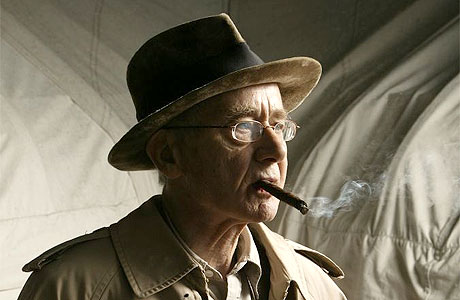
photo: Murdo Macleod.
Alan Sillitoe, 4 March 1928 – 25 April 2010.
Nick Small speaks on behalf of us all at Caught by the River:
I can’t claim to have been an avid reader of Alan Sillitoe in later life. In fact, apart from Raw Material, I don’t think I’ve read anything since my mid-teens. By then, however, he’d made a huge thumb print on my reading life.
As an 11 or 12 year old, I was making my way through Alan Garner’s fantasy worlds, and shipping the southern states of America with Huckleberry Finn. I loved reading, but not much that I read bore any relation to my life: that of a pre-punk in a northern industrial town.
My hero at that time was Brendan Foster, and I fancied myself as a bit of a budding distance runner. Naturally when I happened upon the book of short stories, “The Loneliness of the Long Distance Runner”, I thought I’d give it a whirl.
The timing was perfect. Here was a story with a young hero, a dignified rebel, with a righteous indignation at the palpable injustice of the institution he found himself in. And he was a working class kid. From an industrial town in the North of England (sort of). And he was a runner. And then he went and threw the race that I was rooting for him to win. Shazzam!
For an adolescent with a bubbling sense of injustice, this alienated hero, this outsider, was perfect. His was a story that I could identify with, written with such clarity, such economic precision, it was as though I’d just wiped a thick layer of dust from the screen I viewed life on.
That one short story opened up a whole new world of adult reading for me. It lead directly to The Outsider, Catcher in the Rye, 1984, Homage to Catalonia, Brave New World and ultimately to where I am now. It sparked the interest in literature that shaped my education, and my vocation.
I read “Saturday Night and Sunday Morning” a few years afterwards. A step up in maturity for me, it taught me more about what I imagined my parents’ lives to have been in an early sixties mill town than it did about mine. The cavalier amorality of Arthur, a character who combined the blunt instrument of toughness with an unrefined, but rapier sharp intellect, seemed incredibly attractive to a teenager who would dearly have loved to combine those weapons in his armoury. The fact that he was a hit with the women did little to dull his appeal.
I know that Alan Sillitoe continued to write, and continued to be a force for good, with a keen sense of justice, but I shall not feel guilty about not having made the long journey with him. With one short story he made his mark, hitting the proverbial nail squarely on its proverbial napper, not just for me, but for countless young minds before and since. That is the mark of a truly great writer.
Alan Sillitoe: his work is done.
Previously on Caught by the River:
Mark Hodkinson interview with Alan Sillitoe
and an interview by Jim Crace that we copped from The Guardian in May 2008